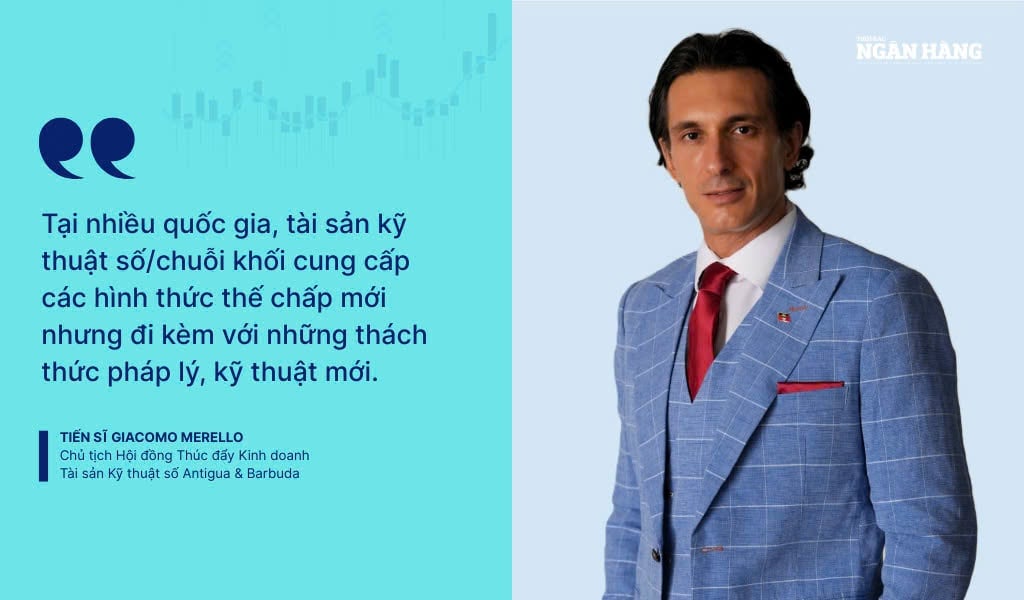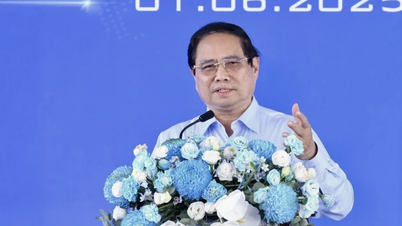Many countries accept digital assets
According to Dr. Giacomo Merello, in the digital era, Blockchain has emerged as a technological revolution, acting as a solid foundation for many breakthrough applications, especially in the fields of finance and banking.
In essence, Blockchain is a decentralized network, consisting of countless computers (also known as network nodes) that together maintain a digital “ledger” that records all transactions. Cryptocurrencies and tokens on the blockchain act as new forms of financial assets (blockchain), becoming potential new forms of financial assets. Typical examples include Bitcoin, Ethereum, Stablecoin.
Despite many issues, according to Dr. Giacomo Merello, in some countries, crypto assets have been accepted as collateral by banks. In February 2023, the SNB included a digital bond (Blockchain-based) in its pool of eligible collateral. This was the first time in the world that a central bank has officially accepted crypto assets. Most recently, the Swiss Exchange (SIX) launched a Digital Mortgage Service that allows institutions to register cryptocurrencies as collateral alongside traditional securities. This combined solution reduces counterparty risk and streamlines operations. Banks also offer crypto-backed loans. Customers can pledge multiple crypto assets for loans...
Meanwhile, Malta was also one of the first countries to regulate cryptocurrencies (Virtual Financial Assets Act 2018), with the aim of becoming a fintech hub. Malta’s regulators are actively adjusting their regulatory frameworks, with Malta pushing for debt tokenization. Meanwhile, Singapore’s Payment Services Act requires licensed digital token service providers. This includes exchanges, custodians, wallet providers, etc., and strict compliance with anti-money laundering and counter-terrorism financing policies and measures. Singapore courts have affirmed that digital tokens are property. In a 2023 case, the Supreme Court ruled that digital tokens are property that can be held in trust. This recognition means that cryptocurrencies can act as collateral/security interests under Singaporean law. Singapore's approach tends to allow for innovation, loosening Basel's "high risk" stance on cryptocurrencies and exploring appropriate reserve definitions.
 |
| Overview of the Workshop |
Suggestions for building a legal framework for Vietnam
Dr. Giacomo Merello said that Vietnam's cryptocurrency market has a lot of potential and people are very interested in this market when nearly 17 million Vietnamese people hold digital assets (as of 2024), with a market value of over 100 billion USD. Vietnam ranks 5th globally in terms of interest in cryptocurrencies and 3rd in terms of exchange usage, showing strong domestic demand.
Vietnam is currently developing a cryptocurrency framework. Draft laws currently define “digital assets” and envision a fintech box (financial hub) where licensed cryptocurrency trading can begin (targeted around July 2026).
To perfect the legal framework for this type, Dr. Giacomo Merello said that Vietnam can take advantage of global lessons such as establishing clear laws on cryptocurrencies as assets and collateral; implementing licensing and custody rules, and encouraging encryption (digital bonds) in the financial center that will be formed in the future.
However, any legal framework for digital assets in Vietnam must aim at the dual goal of facilitating innovation and attracting investment while ensuring the safety of the financial system. To build an effective legal framework for digital assets, Vietnam needs to simultaneously address anti-money laundering and counter-terrorism financing (AML/CFT) issues as well as tax policies. Vietnam could consider a 0.1% tax on cryptocurrencies.
At the same time, regulators can encourage innovation, facilitate trade and investment, by requiring collateral transparency and closely monitoring loan-to-value ratios, to protect the stability of the banking system.
Thus, digital assets/blockchains offer new forms of collateral but come with new legal/technical challenges. In particular, as Vietnam opens its financial hub to cryptocurrencies, it can apply best practices (clear mortgage laws, risk controls) to safely exploit this trend. Banks should evaluate how volatile crypto collateral is, consider what legal changes (ownership, securities records) are needed to manage custody and cyber risks, etc., suggests Dr. Giacomo Merello.
Source: https://thoibaonganhang.vn/tan-dung-kinh-nghiem-quoc-te-de-viet-nam-quan-ly-tai-san-dien-tu-hieu-qua-163455.html




































































































Comment (0)